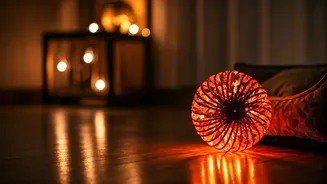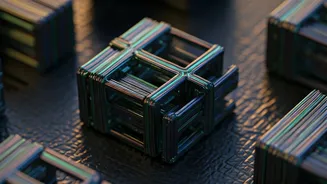Pet-Proofing Your Home
Before the Diwali festivities begin, it's crucial to pet-proof your home thoroughly. Begin by securing all electrical cords; pets, especially puppies and
kittens, are prone to chewing. Hide away or cover any wires that may be accessible. Next, carefully assess the placement of your decorations. Avoid placing heavy diyas or lamps where they can be knocked over. Opt for decorations that are not easily ingested or broken, as pets might be tempted to explore them. Consider using battery-operated candles or lights as a safer alternative to traditional candles, which can pose a fire hazard if tipped over. Make sure all potentially harmful substances like cleaning products, pesticides, and other chemicals are stored securely and out of reach. Additionally, prepare a safe and quiet space, like a crate or a room where your pet feels comfortable, to retreat to when the noise of fireworks and celebrations become overwhelming.
Managing Noise Concerns
Diwali's vibrant sounds and loud noises, particularly fireworks, can often distress pets. Many pets struggle to cope with the sudden loud bangs and bright flashes that are a part of the festival. Start preparing your pets well in advance. Introduce them to sounds gradually, such as through recordings of fireworks played at a low volume and increasing as they get used to it. On the actual night of Diwali, keep windows and doors closed to minimize the sound of fireworks. If your pet has a safe room or crate, make sure they have access to it. Provide them with familiar items, such as their favorite toys or blankets, to help them feel more secure. If your pet shows extreme signs of anxiety, like excessive panting, pacing, or hiding, consulting a veterinarian can provide additional solutions. The veterinarian might prescribe calming aids, such as pheromone diffusers or medications, to help your pet manage stress effectively during the celebrations.
Safe Decorations & Treats
When it comes to Diwali decorations, prioritize your pet's safety. Avoid decorations with small, easily swallowed parts, such as beads, ribbons, or small bells, as these can pose a choking hazard. Choose pet-friendly materials and avoid decorations made from toxic substances. Be cautious of traditional items like rangoli powders, as they could contain substances that are not good for your pets if they lick them. Consider placing decorations away from areas that your pets frequent. Be especially careful when preparing festive treats. Many traditional Diwali sweets contain ingredients that are harmful to pets, such as chocolate, raisins, xylitol, and nuts. Make sure to keep these sweets out of reach. If you are keen on including treats, select pet-friendly alternatives that are free from any harmful substances. Always check ingredient lists and, when in doubt, consult your veterinarian for advice on safe and appropriate treats.
Creating a Calm Environment
Beyond physical safety, creating a calm and comfortable environment is crucial. Maintain your pet's regular routine as much as possible during the festival. Regular feeding times, walks, and playtime help provide a sense of normalcy and reduce stress. If you are hosting a Diwali gathering, inform your guests about your pet's presence and any potential sensitivities. Request that guests avoid giving your pet any treats without your permission. Ensure your pet always has access to fresh water and food. Take time to interact with your pet and offer them reassurance, especially during times of high stress like firework displays. Spend quality time playing, petting, or simply being near them. Even a few minutes of calm interaction can significantly help your pet feel safer and more relaxed during the busy Diwali festivities. Preparing in advance and providing extra love and support can make the Diwali celebrations enjoyable for your entire family.













